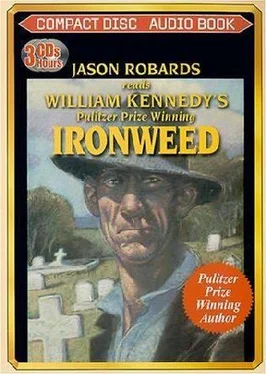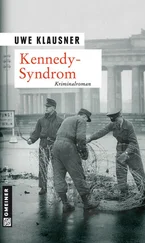William Kennedy - Ironweed
Здесь есть возможность читать онлайн «William Kennedy - Ironweed» весь текст электронной книги совершенно бесплатно (целиком полную версию без сокращений). В некоторых случаях можно слушать аудио, скачать через торрент в формате fb2 и присутствует краткое содержание. Жанр: Современная проза, на английском языке. Описание произведения, (предисловие) а так же отзывы посетителей доступны на портале библиотеки ЛибКат.
- Название:Ironweed
- Автор:
- Жанр:
- Год:неизвестен
- ISBN:нет данных
- Рейтинг книги:3 / 5. Голосов: 1
-
Избранное:Добавить в избранное
- Отзывы:
-
Ваша оценка:
- 60
- 1
- 2
- 3
- 4
- 5
Ironweed: краткое содержание, описание и аннотация
Предлагаем к чтению аннотацию, описание, краткое содержание или предисловие (зависит от того, что написал сам автор книги «Ironweed»). Если вы не нашли необходимую информацию о книге — напишите в комментариях, мы постараемся отыскать её.
Ironweed — читать онлайн бесплатно полную книгу (весь текст) целиком
Ниже представлен текст книги, разбитый по страницам. Система сохранения места последней прочитанной страницы, позволяет с удобством читать онлайн бесплатно книгу «Ironweed», без необходимости каждый раз заново искать на чём Вы остановились. Поставьте закладку, и сможете в любой момент перейти на страницу, на которой закончили чтение.
Интервал:
Закладка:
The Schubert blossom,
Born to bloom unseen,
Like Helen.
Did Arthur do that?
Well, he kept her a prisoner of his love on Tuesdays and Thursdays, when he closed early, and on Friday nights too, when he told his wife he was rehearsing with the Mendelssohn Club. There is Helen now, in that small room on High Street, behind the drawn curtains, sitting naked in bed while Arthur stands up and puts on his dressing gown, expostulating no longer on sex but now on the Missa Solemnis , or was it Schubert’s lieder, or maybe the glorious Ninth, which Berlioz said was like the first rays of the rising sun in May?
It was really all three, and much, much more, and Helen listened adoringly to the wondrous Arthur as his semen flowed out of her, and she aspired exquisitely to embrace all the music ever played, or sung, or imagined.
In her nakedness on that continuing Tuesday and Thursday and unchanging Friday,. Helen now sees the spoiled seed of a woman’s barren dream: a seed that germinates and grows into a shapeless, windblown weed blossom of no value to anything, even its own species, for it produces no seed of its own; a mutation that grows only into the lovely day like all other wild things, and then withers, and perishes, and falls, and vanishes.
The Helen blossom.
One never knows the potential within the human breast.
One would never expect Arthur to abandon Helen for a younger woman, a tone-deaf secretary, a musical illiterate with a big bottom.
Stay on as long as you like, my love, Arthur told Helen; for there has never been a saleswoman as good as you.
Alas, poor Helen, loved for the wrong talent by angelic Arthur, to whom it was given to hurt Helen: who educated her body and soul and then sent them off to hell.
Helen walked from Saint Anthony’s Church to South Pearl Street and headed north in search of a restaurant. She envisioned herself sitting at one of the small tables in the Primrose Tea Room on State Street, where they served petite watercress sandwiches, with crusts cut off, tea in Nippon cups and saucers, and tiny sugar cubes in a silver bowl with ever-so-delicate silver tongs.
But she settled for the Waldorf Cafeteria, where coffee was a nickel and buttered toast a dime. Discreetly, she took one of the dollar bills out of her brassiere and held it in her left fist inside her coat pocket. She let go of it only long enough to carry the coffee and toast to a table, and then she clutched it anew, a dollar with a fifteen-cent hole in it now. Eleven-eighty-five all she had left. She sweetened and creamed her coffee and sipped at it. She ate half a piece of toast and a bite of another and left the rest. She drank all the coffee, but food did not want to go down.
She paid her check and walked back out onto North Pearl, clutching her change, wondering about Francis and what she should do now. The air had a bite to it, in spite of the warming sun, driving her mind indoors. And so she walked toward the Pruyn Library, a haven. She sat at a table, shivering and hugging herself, warming slowly but deeply chilled. She dozed willfully, in flight to the sun coast where the white birds fly, and a white-haired librarian shook her awake and said: “Madam, the rules do not allow sleeping in here,” and she placed a back issue of Life magazine in front of Helen, and from the next table picked up the morning Times-Union on a stick and gave it to her, adding: “But you may stay as long as you like, my dear, if you choose to read.” The woman smiled at Helen through her pince-nez and Helen returned the smile. There are nice people in the world and sometimes you meet them. Sometimes.
Helen looked at Life and found a picture of a twoblock-long line of men and women in dark overcoats and hats, their hands in their pockets against the cold of a St. Louis day, waiting to pick up their relief checks. She saw a photo of Millie Smalls, a smiling Negro laundress who earned fifteen dollars a week and had just won $150,000 on her Irish Sweepstakes ticket.
Helen closed the magazine and looked at the newspaper. Fair and warmer, the weatherman said. He’s a liar. Maybe up to fifty today, but yesterday it was thirty-two. Freezing. Helen shivered and thought of getting a room. Dewey leads Lehman in Crosley poll. Dr. Benjamin Ross of Albany’s Dudley Observatory says Martians can’t attack earth, and adds: “It is difficult to imagine a rocketship or space ship reaching earth. Earth is a very small target and in all probability a Martian space ship would miss it altogether.” Albany’s Mayor Thacher denies false registration of 5,000 voters in 1936. Woman takes poison after son is killed trying to hop freight train.
Helen turned the page and found Martin Daugherty’s story about Billy Phelan and the kidnapping. She read it and began to cry, not absorbing any of it, but knowing the family was taking Francis away from her. If Francis and Helen still had a house together, he would never leave her. Never. But they hadn’t had a house since early 1930. Francis was working as a fixit man in the South End then, wearing a full beard so nobody’d know it was him, and calling himself Bill Benson. Then the fixit shop went out of business and Francis started drinking again. After a few months of no job, no chance of one, he left Helen alone. “I ain’t no good to you or anybody else,” he said to her during his crying jag just before he went away. “Never amounted to nothin’ and never will.”
How insightful, Francis. How absolutely prophetic of you to see that you would come to nothing, even in Helen’s eyes. Francis is somewhere now, alone, and even Helen doesn’t love him anymore. Doesn’t. For everything about love is dead now, wasted by weariness. Helen doesn’t love Francis romantically, for that faded years ago, a rose that bloomed just once and then died forever. And she doesn’t love Francis as a companion, for he is always screaming at her and leaving her alone to be fingered by other men. And she certainly doesn’t love him as a love thing, because he can’t love that way anymore. He tried so hard for so long, harder and longer than you could ever imagine, Finny, but all it did was hurt Helen to see it. It didn’t hurt Helen physically because that part of her is so big now, and so old, that nothing can ever hurt her there anymore.
Even when Francis was strong he could never reach all the way up, because she was deeper. She used to need something exceptionally big, bigger than Francis. She had that thought the first time, when she began playing with men after Arthur, who was so big, but she never got what she needed. Well, perhaps once Who was that? Helen can’t remember the face that went with the once. She can’t remember anything now but how that night, that once, something in her was touched: a deep center no one had touched before, or has touched since. That was when she thought: This is why some girls become professionals, because it is so good, and there would always be somebody else, somebody new, to help you along.
But a girl like Helen could never really do a thing like that, couldn’t just open herself to any man who came by with the price of another day. Does anyone think Helen was ever that kind of a girl?
Ode to Joy, please.
Freude, schöner Götterfunken ,
Tochter aus Elysium!
Helen’s stomach rumbled and she left the library to breathe deeply of the therapeutic morning air. As she walked down Clinton Avenue and then headed south on Broadway, a vague nausea rose in her and she stopped between two parked cars to hold on to a phone pole, ready to vomit. But the nausea passed and she walked on, past the railroad station, until the musical instruments in the window of the Modern Music Shop caught her attention. She let her eyes play over the banjos and ukuleles, the snare drum and the trombone, the trumpet and violin. Phonograph records stood on shelves, above the instruments: Benny Goodman, the Dorsey Brothers, Bing Crosby, John McCormack singing Schubert, Beethoven’s “Appassionata.”
Читать дальшеИнтервал:
Закладка:
Похожие книги на «Ironweed»
Представляем Вашему вниманию похожие книги на «Ironweed» списком для выбора. Мы отобрали схожую по названию и смыслу литературу в надежде предоставить читателям больше вариантов отыскать новые, интересные, ещё непрочитанные произведения.
Обсуждение, отзывы о книге «Ironweed» и просто собственные мнения читателей. Оставьте ваши комментарии, напишите, что Вы думаете о произведении, его смысле или главных героях. Укажите что конкретно понравилось, а что нет, и почему Вы так считаете.












